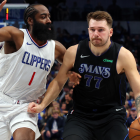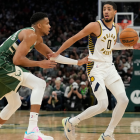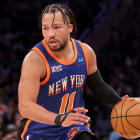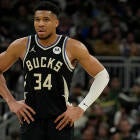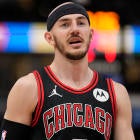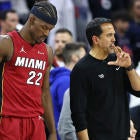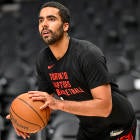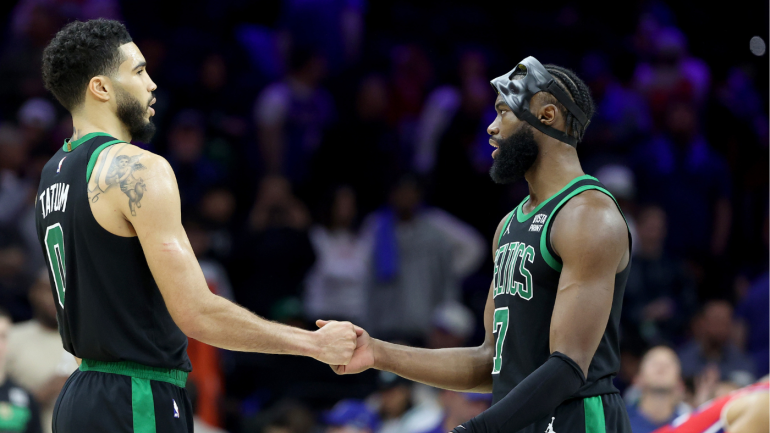
When the NBA introduced the "super max" contract in the 2017 CBA, it needed a firm set of criteria to determine eligibility for that pay bump. While MVP and Defensive Player of the Year also create eligibility, the simplest and most consistent method is an All-NBA selection. If a player has been selected to an All-NBA team in the most recent season or in two of the previous three, he becomes eligible for a super max deal.
That makes the announcement of a given season's All-NBA picks among the most important days on the league's economic calendar. On Wednesday, this season's selections were revealed by the NBA, and now, the teams involved know whether or not their players will be eligible for those colossal deals. With that in mind, here are some of the biggest financial implications of Wednesday's All-NBA choices.
Boston gets pricier
The NBA's new CBA went out of its way to create a rule designed to keep Jaylen Brown in Boston. The so-called "Jaylen Brown" rule revised the league's veteran extension guidelines so that most players could receive a 40% raise on their old deals when extending compared to the previous 20%. This change would have allowed Brown, who was underpaid on his last deal, to reach his maximum in an extension with the Celtics this offseason. Ironically, that rule is now irrelevant to Brown and the Celtics. As an All-NBA player, he is no longer bound by veteran extension guidelines. This offseason, he can simply re-sign with the Celtics for the full, 35% max.
But Brown isn't the only Celtic affected here. In 2021, Jayson Tatum missed out an All-NBA selection and lost $33 million in the process. He wasn't happy about it and publicly complained about the entire process. But his selection on Wednesday rectifies that mistake. He, too is eligible for a super max extension now that he has earned All-NBA honors in the past two seasons, though he will not be able to sign it until the summer of 2024. In total, these two deals would pay Brown (roughly $295 million) and Tatum (roughly $318 million) over $600 million combined.
Tatum will get that money. Brown's situation is a bit more complicated. He isn't the no-brainer All-NBA player that Tatum is, and by locking in both of them at these prices, Boston would be committing an enormous chunk of its payroll to two players. It would be a worthwhile cost for two steady All-NBA players, but we've seen teams trade players in Brown's situation to avoid paying the super max. Chicago dealt Jimmy Butler under those circumstances and still regrets it. Now it's up to the Celtics to decide if they want to keep this team together or hit the eject button on their long-time core.
No super max for Siakam
Pascal Siakam is a prime example of a player punished for poor timing. Last season, he earned All-NBA Third-Team honors. He would have been eligible for an extension at the time as he hit the three-year anniversary of his previous deal, but as he had two years remaining on his contract, he only could have added three new seasons to the deal. Whether that was the explanation or not, Siakam and the Raptors chose not to agree to an extension.
Now he's only one year away from free agency, but he won't be eligible for a super max deal because missed All-NBA this year and in 2021, so he doesn't hit the two out of three years criteria either. Siakam could still sign an extension this offseason, but at the lower, non-super max level, it isn't the slam dunk it otherwise could have been.
The 2019 draft class misses out
The 2019 draft class has thus far produced three All-Stars: Zion Williamson, Ja Morant and Darius Garland. All three of them signed maximum rookie extensions last offseason. Those deals were worth a minimum of $193 million, but could get up to around $231 million with "Rose Rule" escalators that would have triggered upon any of the three players earning All-NBA honors. None of them did, so nobody in the 2019 class ultimately earns super max eligibility for their rookie extensions.
Williamson was no surprise. He missed most of the season due to injury. Garland was healthy, but overshadowed by new teammate Donovan Mitchell. He was not realistically going to make an All-NBA team. But Morant felt like a near-lock in the middle of the season, when the Grizzlies were rolling and he looked like an MVP candidate. And then he needed to take a leave of absence to address personal issues, and his support waned.
This is where the situation gets crazy: Morant is currently embroiled in a legal battle with teenager Joshua Holloway, who sued him after an incident that took place during a pickup game played at Morant's home last July. In April, Morant countersued Holloway. Part of Morant's accusation is that Holloway's suit would cost him the All-NBA support he needed to earn that extra $38 million in salary. We don't know where that suit will, but this has to be the first time in NBA history that a legal battle was fought over an All-NBA selection.
Silver lining for Sabonis
The guidelines governing super max deals were originally put in place to help teams retain players that they drafted. A player can only become eligible on the team that drafted him or traded for him during his rookie deal. Domantas Sabonis doesn't qualify. Even though he was named to an All-NBA team on Wednesday, he was traded to the Kings after his rookie deal. That makes him ineligible for a super max regardless of what he does in Sacramento.
Sabonis didn't ask to be traded by Indiana. The Pacers traded him because they wanted Tyrese Haliburton, yet Sabonis is punished because the rule was designed to prevent stars who forced trades from financially benefitting from that decision. That restriction is especially unfair to Sabonis because he is already woefully underpaid. He will make just $19.4 million next season. The Kings would love to give him an extension this summer, but even with the league's new 40% rule, the most they could give him in the first year of a new deal is $27.2 million. That isn't close to what he is worth.
So here we have a situation where both a player and team would probably like to agree to a market-value extension... but the rules simply won't allow it. The Kings will probably have to wait until 2024 free agency to re-sign Sabonis at a fair price, and if things go south next season, they face the very real risk that he walks for nothing. The only silver lining here is that Sabonis was at least able to earn a $1.3 million All-NBA bonus by virtue of Wednesday's selection. It's not much, but at least it is some financial recognition for his incredible season.














